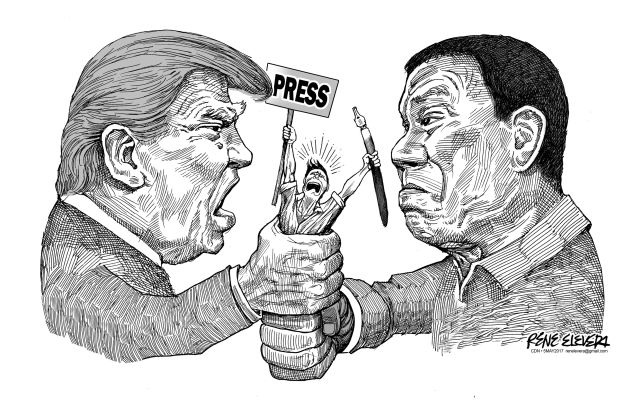
Last Wednesday, the world’s media outlets both small and big celebrated World Press Freedom Day, and along with the challenges from a burgeoning social media, they also have to deal with leaders who are not only hostile but dismissive of their continued influence on society and stakeholders alike.
In the US, President Donald Trump’s adversarial relations with the media started the minute he won in the elections, with his victory causing the liberal Left and the political elite in Washington much grief.
For every pronouncement he makes against news presented by US mainstream media, Trump laces it with the key words “alternative facts,” a catch phrase meant to persuade the Americans that what they’re getting from their networks and newspapers are all staged, fabricated lies and that the “only truth” comes from his Twitter account and his official press statements.
The same can practically be said of the Philippine mainstream media’s relations with President Rodrigo Duterte. But unlike Trump, Duterte won by popular vote and a landslide victory over his closest rival, an administration candidate whose party is now fighting for political survival.
And unlike Trump, who remains generally nonplussed about being the most unpopular US leader in modern times, Duterte has used his continued popularity with the masses to launch tirade after tirade against the mainstream media, two of which he accused of being owned by oligarchs.
The President’s subalterns have rephrased his verbal attacks by saying these were aimed at those companies that have not paid the right amount of taxes to the government.
The irony of the President’s attacks on media outlets owned by oligarchs isn’t lost when one considers him sitting and dining with some of the country’s former leaders who have, in one way or another, faced charges of corruption during and after their stay in power.
When it’s not the President, his followers, whose expertise on social media is considerable, use the online platform to wage a propaganda war against his political enemies by spreading their own version of “alternative facts.”
It’s a scenario that the mainstream media had encountered before, and it’s no less daunting. Whereas before their leading lights were shut down forcibly by the Marcos regime, mainstream or traditional media now have to deal with a government that has no compunction nor hesitation to crack down and threaten to close them down for good.
As to whether there will be improved relations between the mainstream media and President Duterte, only time can tell. But barely into his first year in office, an atmosphere of unease exists that can tip anytime dangerously close to outright censorship.